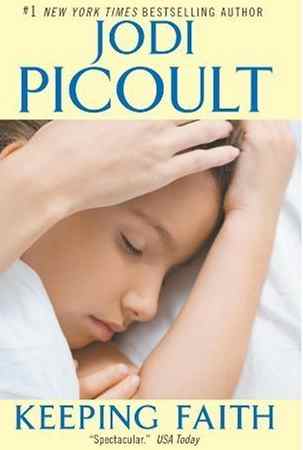 Synopsis:
Synopsis:
Somewhere between belief and doubt lies faith. For the second time in her marriage, Mariah White catches her husband with another woman and Faith, their seven year old daughter, witnesses every painful minute. In the aftermath of a sudden divorce, Mariah struggles with depression and Faith seeks solace in a new friend . . . a friend who may or may not be imaginary.
Faith talks to her “Guard” constantly; begins to recite passages from the Bible — a book she’s never read. Fearful for her daughter’s sanity, Mariah sends her to several psychiatrists. Yet when Faith develops stigmata and begins to perform miraculous healings, Mariah wonders if her daughter — a girl with no religious background — might indeed be seeing God. As word spreads and controversy heightens, Mariah and Faith are besieged by believers and disbelievers alike, caught in a media circus that threatens what little stability they have left.
What are you willing to believe? Is Faith a prophet or a troubled little girl? Is Mariah a good mother facing an impossible crisis — or a charlatan using her daughter to reclaim the attention her unfaithful husband withheld? As the story builds to a climactic battle for custody, Mariah must discover that spirit is not necessarily something that comes from religion, but from inside oneself.
Fascinating, thoughtful, and suspenseful, Keeping Faith explores a family plagued by the media, the medical profession, and organized religion in a world where everyone has an opinion but no one knows the truth. At her controversial and compelling best, Jodi Picoult masterfully explores the moment when boundaries break down, when illusions become reality, and when the only step left to take is a leap of faith.
Review:
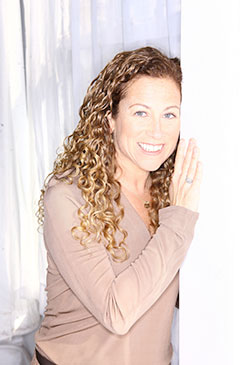
When evaluating a work of fiction, several factors are important to me. First, I consider whether the storyline was surprising. There is nothing more disappointing to me than realizing as I am reading that I know exactly how the story is going to progress, what the characters are going to do, and what the ending is going to be. Picoult’s story was unpredictable. As I was reading, I only reluctantly tore myself away from the pages because I absolutely had to. I was completely engrossed in the story because I simply could not imagine how she was going to weave the various branches of the story into a cohesive conclusion. Put simply, Keeping Faith is an example of great storytelling.
“What if what you believed wasn’t as important as that you believed? What if we were all able to entertain someone else’s point of view about God?” ~~ Jodi Picoult
Secondly, I love ambiguous characters. The most interesting, thought-provoking fiction features at least one character whose motivations and intentions are not obvious and may appear to evolve as the story unfolds, although it is never entirely clear until the conclusion, if ever. In Keeping Faith, that character is Ian Fleming, a brash, arrogant television anti-evangelist who has achieved success by traveling the world attempting to discredit believers, ridiculing them for being gullible. Ian is ready for neither faith in something larger than his own ego nor Faith, a seemingly-innocent child around whom several controversies swirl. Wondering what decisions Ian would make and what path he would choose as he stood at a crossroads in his own life and spiritual journey compelled me to keep reading.
In order to really enjoy a fiction story, there must also be at least one character with whom I can identify. Every mother who reads Keeping Faith will be able to see a little part of herself in Mariah White, who is determined to be the best possible mother to Faith that she can be, but constantly second-guesses her own strength, abilities, and choices. Her doubts are universal and make her the “common man” in this narrative. Picoult employs a literary technique that was initially jarring, but ultimately very effective: The narrative alternates between third and first person. At varying intervals, she uses Mariah’s voice to reveal plot developments and describe her emotional reaction to what is transpiring.
Mariah’s supportive, if sometimes overbearing mother, Millie, describes motherhood as a “work in progress.” Millie is a catalyst for both the unfolding story and Mariah’s maturation. I cheered for Mariah, willing her to become empowered to stand up for herself and her daughter, and squarely face the truth rather than hide from it. And at several junctures, I applauded Millie’s blunt honesty and example of unwavering support for her daughter and granddaughter. Picoult uses Millie to force the reader to examine the mother-daughter dynamic, in part because the relationship between Mariah and her mother is, at least on the surface, vastly different from the way Mariah and Faith interact. Or is it? The reader has to decide for him/herself.
In contrast, Colin White, Mariah’s philandering ex-husband, stirred little compassion in me until the story was almost concluded. Picoult did not reveal him to be much more than a one-dimensional louse until the story arrived at a couple of pivotal moments well past the mid-point. Picoult’s timing, whether deliberate or not, was effective and consistent with the tale’s ultimate resolution.
And, of course, there is little Faith, a remarkable child. But anyone who has ever raised a child knows that children can be wonderful deceivers for myriad reasons, especially if they have lived through a traumatic event. Children of divorce can be particularly manipulative without even realizing it because they want to put their fractured family back together. Also, they frequently blame themselves, a fact that the adults in their lives don’t always recognize and confront. Against that backdrop, Faith reports that she is conversing with a friend that her mother and psychiatrist believe is imaginary. When extraordinary events, attributed to Faith, occur, the reader, as well as the other characters in the book, must determine what is true and what is imagined or even concocted — by Faith or the adults around her. It is an enticing quagmire because the reader does not want to believe that a seven year old could be devious enough to create the controversies depicted in the book, and yet the incidents seemingly defy rational explanation.
The third factor that I consider is whether or not a book really inspired me to consider the questions it posed, and think about how the issues raised in the story resonate in my own life experience. Keeping Faith, like Nineteen Minutes, gets a perfect score in this category. Picoult’s preeminent talent is her ability to confront readers with moral and ethical dilemmas, and allow them to draw their conclusions. She refrains from answering all of the questions she raises through the resolution of her story, the choices her characters ultimately make. As with Nineteen Minutes, I put down the book after reading the last page, and walked away from it, but considered pondering it afterward.
After reading Keeping Faith, the reader could just consider it an entertaining story, an enjoyable read. But that is not Picoult’s intent. The story evolved from a conversation Picoult had with her own then-five year old son in which he asked, “What’s God?” Picoult is a kindred spirit with many of us Baby Boomers: “Like many people of my generation, faith was a tricky road for me. I had dozens of friends who had gone to church as children . . . but now, as adults, didn’t. They wanted their kids to have some sort of religious cornerstone . . . but felt hypocritical attending for the sake of the kids, when they weren’t sure they wanted to go themselves.” And for that reason, Keeping Faith is not just a brilliant, double-entendre title, but also stands as an engrossing allegory about the struggle many people today have with the God and religion of their parents’ generation. Many of us are skeptical and have concluded that we cannot simply accept — on faith — what we were taught in the churches of our childhoods. Yet we desire to be enlightened and express our spirituality. While entertaining, Keeping Faith also facilitates the exploration of that conundrum.

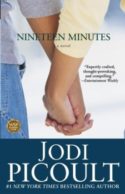
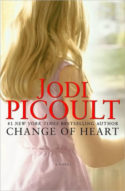


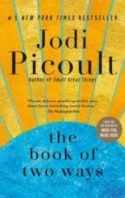
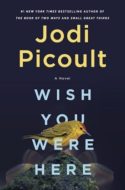



13 Comments
[New Post] Book Review: Keeping Faith https://www.jhsiess.com/2010/05/01/keepin…
Your reviews are beautiful. So professional!
Very in-depth review, excellently written. 🙂
It seems like a very emotional book. I’m actually a big fan of books that continue to challenge our faith. I’m looking for a good book to read now and this might just be it.
I read this book recently; it’s a beautiful story. Very good review.
This is a great professional review. I am interested in getting my hands on this book for sure.
Nice review! You convinced me to buy this book. I’ve heard about Jodi Picoult before; seems she has a lot of talent.
I love the way you have described the whole story.
A must-read book for me. I like the story, and how the story develops, as well. You had a an professional review, also, which makes me wanna grab a copy of Jodi Picoult’s book.
Pingback: Saturday Review of Books: May 1, 2010 | Semicolon
great review! I really like Jodi Picoult’s books but haven’t read this one yet – thanks for spotlighting it!
.-= Colleen(Books in the City)´s last blog . . . Review: Season of Second Chances by Diane Meier =-.
Excellent review! I’ve never read any of Jodi Picoult’s books but I will definitely have to find this one. It sounds really good. Thanks for the review!
.-= Melissa Henderson´s last blog . . . Book Review: James and the Giant Peach by Roald Dahl =-.
Pingback: The Mad Editor’s Round-Up #20 | Diary of a Mad Editor